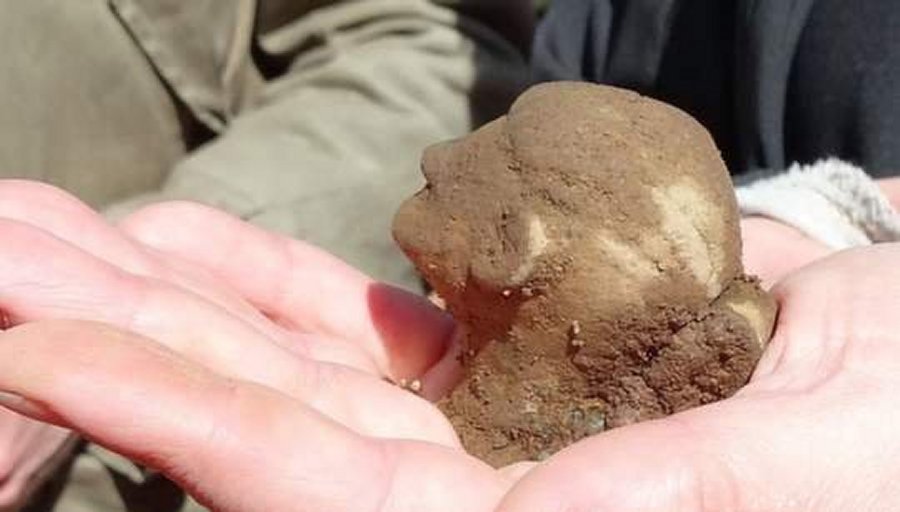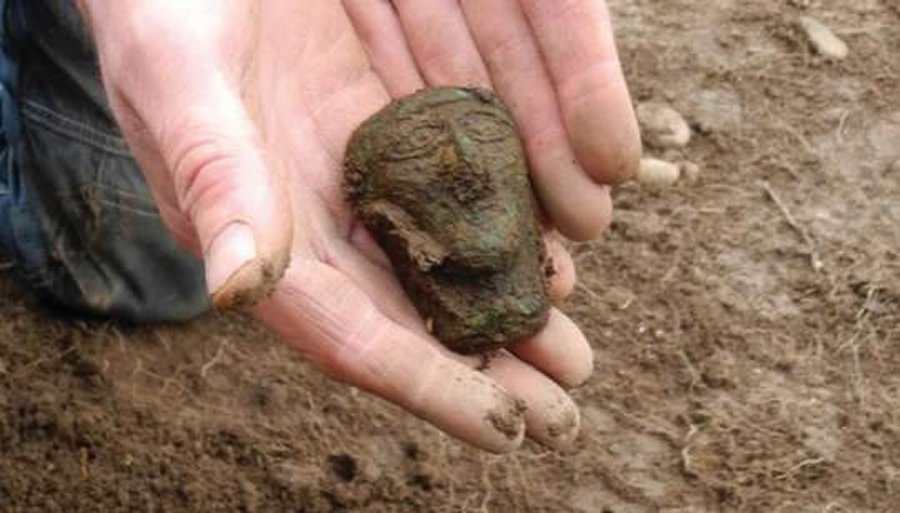Amazing Discovery Of 29 Ancient Gold Men Unearthed In Sweden
AncientPages.com - Archaeologists in Sweden have made an astounding discovery unearthing 29 ancient figurines of gold men ("guldgubbar") dating back to the Iron Age.
Working in great secrecy, archaeologists made this sensational find in Blekinge at West Vång peasant village northeast of Ronneby, located in southern Sweden.
"We have been very afraid of looting and carefully made sure to secure this location with metal detection rings," says Mikael Henriksson, an archeologist at Blekinge Museum to the Swedish newspaper Sydnytt.
No fewer than 29 anthropomorphic gold foils, gold men so-called "guldgubbar" have been discovered at the site.
This is the third-largest find of gold men to have been made in Sweden to date. One hundred similar figurines were discovered about 10-15 years ago at the Uppåkra site outside of Lund, and the in the 1980s, some 60 were stumbled upon in Slöinge, Halland. They are made from a thin gold foil and they depict figures of men and women.
They are 1-2 cm high and are imprinted on one side. They date from the 6th century and a few hundred years beyond.
The last time any gold object was found in Blekinge was back in the 1930s when a gold bracteate was stumbled upon on the island of Senoren, located in the Blekinge archipelago.
"Without a doubt, this was an important location during the Iron Age and for several hundred years onward", says Mikael Henriksson.
"It is apparent that we can begin a new chapter in our research into the Iron Age in Blekinge."
Gold men ('guldgubbar') are most often found in locations associated with power or religious rites. Nothing of its kind has ever before been found in Blekinge.
"Perhaps the location once served as a place of worship, but as yet we can only speculate. What we do know at present is that the site was once a settlement during the Iron Age", Mikael Henriksson continues.
In addition to the gold men ('guldgubbar') the archaeologists found five bronze cast heads, fragments of a vessel, as well as other bronze objects, Roman glass, gold spirals, and Viking- age coins.
The find can be dated to a period between the birth of Christ and the early Middle Ages.
Other finds indicate that the people worked in such industries as the production of iron, blacksmithing, bronze handicrafts and the manufacture of glass beads.
Naturally, artifacts of a more mundane nature have been found at the settlement.
However, the new finds suggest a more complex element to the site. Archaeologists now understand that this special place was more than just a dwelling settlement. Not far from the figurines, archaeologists discovered what appears to be an old temple.
We disagree on what to call it. But there is a big building that probably has been used for some sort of ritual, says Björn Nilsson, Senior Lecturer in Archaeology at Södertörn University to Sydnytt.
There are many questions concerning the settlement and the new finds:
How should the artifacts and finds be interpreted? How do they relate to each other in time and space?
How can the site and the findings be placed in a greater context?
It will take some time before scientists can answer these fascinating questions. For now, we know that the 29 gold men have revealed that the hill at the Western Vång has hidden many historical secrets that are now beginning to come to light.
AncientPages.com
Expand for referencesReferences:
More From Ancient Pages
-
 The Third Greatest Fire Temple That Existed In Ancient Iran’s Sassanid Age – Unearthed
Archaeology | Jul 8, 2022
The Third Greatest Fire Temple That Existed In Ancient Iran’s Sassanid Age – Unearthed
Archaeology | Jul 8, 2022 -
 Treasures From Ancient City Of Hippos-Sussita Displayed In Exhibition For The First Time
Archaeology | Jan 3, 2018
Treasures From Ancient City Of Hippos-Sussita Displayed In Exhibition For The First Time
Archaeology | Jan 3, 2018 -
 Medieval Ship Discovered Off The West Coast Of Sweden May Have Been Attacked By Pirates
Archaeology | Feb 4, 2022
Medieval Ship Discovered Off The West Coast Of Sweden May Have Been Attacked By Pirates
Archaeology | Feb 4, 2022 -
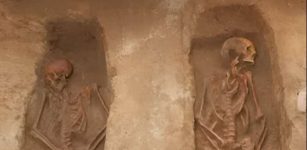 DNA Study Of Remains At Delaware Site Find Kinship Among European Settlers, African Slaves
Archaeology | Aug 3, 2023
DNA Study Of Remains At Delaware Site Find Kinship Among European Settlers, African Slaves
Archaeology | Aug 3, 2023 -
 Child’s Play: Are Tibetan Hand And Foot Traces The Earliest Example Of Parietal Art?
Archaeology | Sep 18, 2021
Child’s Play: Are Tibetan Hand And Foot Traces The Earliest Example Of Parietal Art?
Archaeology | Sep 18, 2021 -
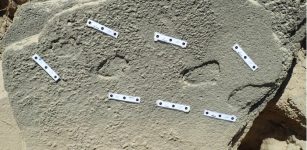 Ancient Footprints Offer Evidence Humans Wore Shoes 150,000 Years Ago – Scientists Say
Archaeology | Sep 11, 2023
Ancient Footprints Offer Evidence Humans Wore Shoes 150,000 Years Ago – Scientists Say
Archaeology | Sep 11, 2023 -
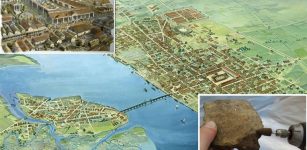 London Is Twice As Old As Previously Thought – New Discovery Reveals
Archaeology | Apr 9, 2020
London Is Twice As Old As Previously Thought – New Discovery Reveals
Archaeology | Apr 9, 2020 -
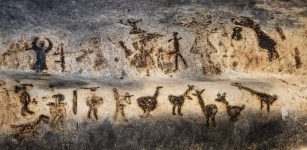 Elusive Non-Binary Gender In Prehistoric Europe – A Forgotten Minority
Archaeology | May 26, 2023
Elusive Non-Binary Gender In Prehistoric Europe – A Forgotten Minority
Archaeology | May 26, 2023 -
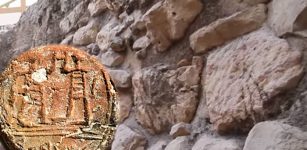 Unique 2,700-Year-Old Seal That Belonged To ‘Governor Of The City’ Of Jerusalem Discovered
Archaeology | Jan 2, 2018
Unique 2,700-Year-Old Seal That Belonged To ‘Governor Of The City’ Of Jerusalem Discovered
Archaeology | Jan 2, 2018 -
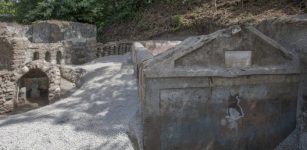 Unusual And Well-Preserved Skeleton Discovered In Ancient Pompeii Sheds New Light On The Cultural Life Of The City
Archaeology | Aug 18, 2021
Unusual And Well-Preserved Skeleton Discovered In Ancient Pompeii Sheds New Light On The Cultural Life Of The City
Archaeology | Aug 18, 2021 -
 Oil Lamps, Spearheads And Skulls: Was The Te’omim Cave Used By Practitioners Of Necromancy?
Archaeology | Jul 15, 2023
Oil Lamps, Spearheads And Skulls: Was The Te’omim Cave Used By Practitioners Of Necromancy?
Archaeology | Jul 15, 2023 -
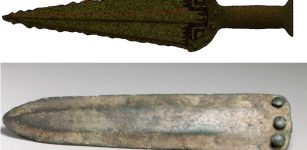 Scientists Can Finally Answer What Bronze Age Daggers Were Used For
Archaeology | Apr 29, 2022
Scientists Can Finally Answer What Bronze Age Daggers Were Used For
Archaeology | Apr 29, 2022 -
 Mystery Of A 5,000-Year-Old Mass Grave In Poland Reveals A Family Tragedy
Archaeology | May 14, 2019
Mystery Of A 5,000-Year-Old Mass Grave In Poland Reveals A Family Tragedy
Archaeology | May 14, 2019 -
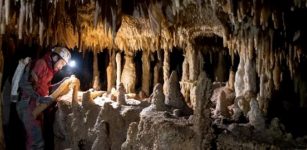 Neanderthals Of The Mediterranean Areas Became Extinct But Not Because Of Climate
Archaeology | Jul 20, 2020
Neanderthals Of The Mediterranean Areas Became Extinct But Not Because Of Climate
Archaeology | Jul 20, 2020 -
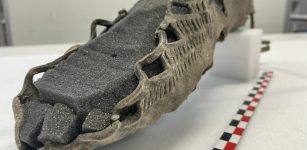 Startling Roman-Looking Sandal Discovered Buried Deep Beneath The Snow In Norwegian Mountains
Archaeology | Apr 13, 2022
Startling Roman-Looking Sandal Discovered Buried Deep Beneath The Snow In Norwegian Mountains
Archaeology | Apr 13, 2022 -
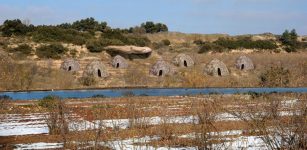 13,000-Year-Old Engraving May Depict First Paleolithic Social Group Of Humans
Archaeology | Dec 4, 2015
13,000-Year-Old Engraving May Depict First Paleolithic Social Group Of Humans
Archaeology | Dec 4, 2015 -
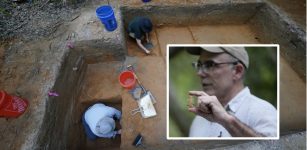 12,000-Year-Old Artifacts In Louisiana Saved By Scientists
Archaeology | Jul 18, 2023
12,000-Year-Old Artifacts In Louisiana Saved By Scientists
Archaeology | Jul 18, 2023 -
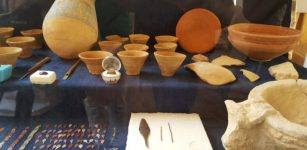 New Discoveries In the Valley Of The Monkeys In Luxor, Egypt
Archaeology | Oct 11, 2019
New Discoveries In the Valley Of The Monkeys In Luxor, Egypt
Archaeology | Oct 11, 2019 -
 500 Million Year-Old Fossils Solve A Centuries-Old Evolutionary Riddle
Archaeology | Nov 7, 2022
500 Million Year-Old Fossils Solve A Centuries-Old Evolutionary Riddle
Archaeology | Nov 7, 2022 -
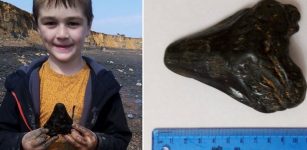 Schoolboy Finds A Huge 3,000,000-Year-Old Megalodon Shark Tooth On British Beach
Archaeology | May 9, 2022
Schoolboy Finds A Huge 3,000,000-Year-Old Megalodon Shark Tooth On British Beach
Archaeology | May 9, 2022



